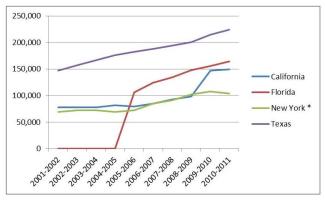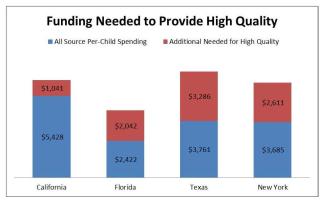
FDR’s Advice to Pre-K’s Big Four
May 15, 2012
When the auto industry mentions “The Big Three,” all eyes turn to Detroit. The Big Three’s dominance in automotive engineering lasted for decades before years of failing to pay attention to critical signs caught up with them. As NIEER’s The State of Preschool 2011: State Preschool Yearbook indicates, early education has its own version of dominance in “The Big Four” – California, Florida, New York, and Texas – whose stories deserve a closer look.
Four states in very different regions largely dominate pre-K enrollment numbers in the United States and each served more than 100,000 children in the 2010-2011 year. Texas, Florida, California, and New York together serve more than 642,000 3- and 4-year-olds in their state pre-K programs, nearly half (48.5 percent) of the country’s reported 1.3 million students in state-funded pre-K enrollment. The Big Four’s reach is significant but, as the Yearbook reveals, there’s more to the story than enrollment figures alone.
Florida, a pre-K “late bloomer” whose program began in 2005, led the country in enrolling the highest percentage of 4-year-olds in state pre-K programs in 2010-2011, reaching more than 75 percent. Similarly, New York and Texas served approximately half of 4-year-olds age-eligible for pre-K (though New York remains stalled in achieving universal access by the 2013-2014 deadline established by the state’s Legislature). If you are 4 years old in California, your chances of participating in a state pre-K program drop even lower to one in five. Quite a spread, indeed indicating insufficient capacity to enroll all age-eligible children.
Total Number of Children Enrolled State-Funded Pre-K in “the Big Four”

* During this time, New York provided pre-K through more than one program.
Quality among the Big Four is another story. New York fared best among the group meeting seven of 10 NIEER’s quality standard benchmarks (20 states meet eight or more). The other three states find themselves in the shallow end of the national pool with California and Florida meeting only three benchmarks and Texas slightly better at four. This means that almost half of the nation’s children attending pre-K cannot be guaranteed the kind of quality early education experience known to benefit them.
As we have learned from previous research, quality costs. Quality is not inexpensive, but it is cheaper than the long-term costs associated with poor quality. As states continue to use a variety of funding mechanisms for pre-K in difficult economic conditions, it stands to reason that failing to make adequate investments do more harm than good. Each Big Four state came up short for providing sufficient resources to meet NIEER’s 10 Quality Standards Benchmarks, as seen below and in Table 7 of our State Preschool Yearbook.
Per-Child Funding Levels Necessary to Ensure High Quality in “the Big Four”

In order to meet all 10 Quality Standards Benchmarks and pay pre-K teachers on par with kindergarten teachers, each of these four states would need to provide additional funding per child. Nationwide, programs spend a total of $4,847 per child from all funding sources. Of the Big Four, only California exceeds this average. In both Florida and Texas, per-child funding would need to be nearly doubled in order to ensure high quality.
The Big Four aren’t the only ones guilty of prioritizing expansion over quality—over the last 10 years, per-child funding has decreased nationwide by more than $700 per child, which inevitably affects the quality of a child’s preschool experience. At the same time, enrollment nationwide has roughly doubled. Quality, access, and resources demand a delicate balancing act, but states have focused their attention on increasing enrollment, to the detriment of other areas.
Franklin Delano Roosevelt once said, “We can afford all that we need; but we cannot afford all we want.” If policymakers in the Big Four and other states are to make good on their promise of cultivating an educated public and skilled, competitive workforce, they’d be wise to heed FDR’s advice. Voluntary access to high-quality early education for all children is more than a want; it is something we need, and state budgets and policies should reflect our needs.
– Jim Squires, Senior Research Fellow, NIEER
The Authors
About NIEER
The National Institute for Early Education Research (NIEER) at the Graduate School of Education, Rutgers University, New Brunswick, NJ, conducts and disseminates independent research and analysis to inform early childhood education policy.

